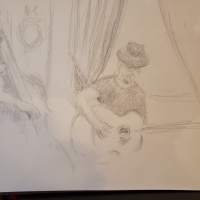DjangoBooks.com
Welcome to our Community!
Categories
- 17.9K All Categories
- 396 General
- 257 Welcome
- 10 Archtop Eddy's Corner
- 74 CD, DVD, and Concert Reviews
- 29 FAQ
- 9 Gypsy Jazz Italia
- 17 Photos
- 24 Gypsy Picking
- 3 Unaccompanied Django
- 1 Pearl Django Play-Along Vol.1
- 1 Gypsy Fire
- 21 Gypsy Rhythm
- 552 Gypsy Jazz University - Get Educated
- 104 Gypsy Jazz 101
- 176 Repertoire
- 128 History
- 88 Technique
- 39 Licks and Patterns
- Daniel Givone Manouche Guitare Method Users Group
- 17 Eddie Lang Club
- 1K Gypsy Jazz Gear
- 648 Guitars, Strings, Picks, Amps, Pickups and Other Accessories
- 316 Classifieds
- 36 Recording
- 38 Other Instruments
- 17 Violin
- 3 Mandolin
- 6 Accordion
- 3 Bass
- 9 Woodwinds
- 197 Gypsy Jazz Events
- 78 North America
- 81 Europe
- 38 International
In this Discussion
Humidity Check... it's that time of year again.
 Bob Holo
Moderator
Bob Holo
Moderator
Humidity check time. I was playing a bit today and was thinking: "Damn, I like the finish job on this one, it really shows the grain of the top" .... and yet it seemed to play a little low & "slappy"... and then I noticed that I could feel the fret ends just a little. Hmmm....
Well... it's that time of year, folks.
- If the grain on your soundboard is more visible than it usually is...
- If your action seems a little low or somehow your guitar just sounds a bit more buzzy or metallic or less powerful than it usually does...
- If you can feel your fret ends...
Then you need to humidify. It'll help the sound of your guitar, the playability of your guitar, and it'll make it more resistant to the types of problems that low humidity causes... popped frets... popped glue joints... cracks... all that nasty stuff that costs you time and money and inconvenience; and that shortens the life of your guitar.
Well... it's that time of year, folks.
- If the grain on your soundboard is more visible than it usually is...
- If your action seems a little low or somehow your guitar just sounds a bit more buzzy or metallic or less powerful than it usually does...
- If you can feel your fret ends...
Then you need to humidify. It'll help the sound of your guitar, the playability of your guitar, and it'll make it more resistant to the types of problems that low humidity causes... popped frets... popped glue joints... cracks... all that nasty stuff that costs you time and money and inconvenience; and that shortens the life of your guitar.
You get one chance to enjoy this day, but if you're doing it right, that's enough.
Tagged:











Comments
cheers
Phil
Do you have any thoughts on the best humidity for gypsy guitars? And how much humidity is too much? I've never gotten a good answer to that question.
BTW, thanks so much for all you thoughts and suggestions regarding the Busato. The work on the neck is beginning this week. We'll see where we end up. I'm just hoping the heat doesn't mess with the lamination.
I mean, sure... over centuries, wood becomes less hygrosopic as the glycols in the hemicellulose oxidize and bond less readily with hydrogen, but reasonable humidity is still important for a lot of reasons - glues - finish - joints between different materials... Lots of things absorb water. Hell, even nylon has a hygroscopic expansion coefficient. It's like Stephane Wrembel says: "Water is life, man!"
So yes, definitely - all guitars should be kept properly humidified.
40 to 50% is a good range. If you can only manage 42, then go for 42... as that's much much better than 32...
So.. you're right - cellulose isn't made up of carbohydrates etc... so it's a little more stable than hemicellulose - but cellulose breaks down too. I think it actually hydrolizes instead of oxidizes though... or maybe both. Haha... again... "I only learns what I needs to learns..." but I think part of it converts to an acid... which is why its good to remove old pickguards when they start to discolor and look like they have a white fungus & etc...
Anyway - I'm not a chemist, so don't use what I say in a research paper (lol) but yes, wood retains the ability to absorb water for a looooong time...
...which is yet another reason to keep your instruments humidified... ;-) (right?)
BTW, i´m a chemist and i have to struggle a lot to keep up with much less... a guy just tends focus on what´s meaningful to him, i guess...
cheers,
miguel.
I have used the planet waves instrument humidifiers.
here's a link.. http://tinyurl.com/7ozdrym
-if there is something better out there i'd like to know.
@Bob - is there a particular humidifier you use/prefer/suggest?
I just wonder if I am doing something wrong and not worried about sounding stupid...